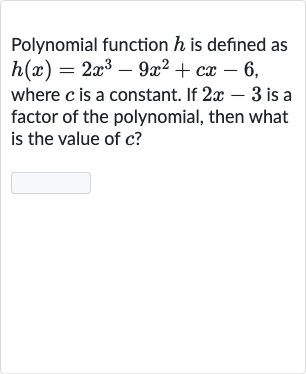Full solution
Q. Polynomial function is defined as , where is a constant. If is a factor of the polynomial, then what is the value of ?
- Apply Factor Theorem: Since is a factor of the polynomial , we can use the Factor Theorem which states that if is a factor of a polynomial, then the polynomial will equal zero when equals .
- Find x value: Let's find the value of x that makes equal to zero. We solve the equation for x.
- Substitute into : Now we substitute into the polynomial and set it equal to zero, because the Factor Theorem tells us that should be zero if is indeed a factor.
- Calculate : We calculate each term separately:Now we substitute these values into the equation:
- Simplify terms: Simplify each term:Now we have:
- Combine like terms: Combine like terms and simplify the equation:
- Combine constant terms: Combine the constant terms:So we have:
- Solve for c: Now we solve for c:Multiply both sides by to isolate c:

